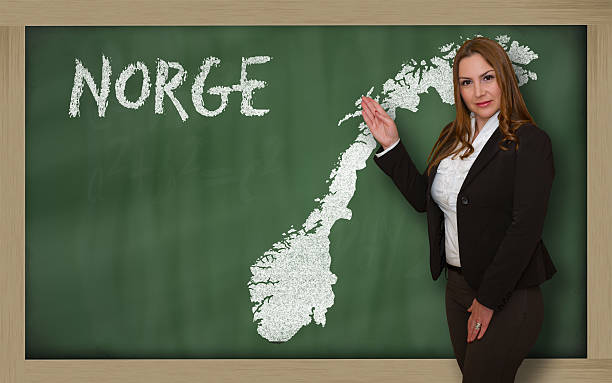Pathway to the Fjords: A Comprehensive Guide to Scholarships in Norway for International Students
Embarking on a Master’s degree in Norway unlocks a world of academic excellence and cultural immersion. However, the cost of tuition can be a significant hurdle for international students. This comprehensive guide equips you with the knowledge and strategies to navigate the scholarship landscape in Norway and secure funding for your postgraduate studies.
Understanding Scholarship Opportunities:
A multitude of scholarship programs exist in Norway, catering to different academic backgrounds, nationalities, and financial needs. Here’s a breakdown of the main categories to equip you with a foundational understanding of your funding options:
-
Government Scholarships: The Norwegian government offers prestigious scholarship programs like the Quota Scheme for Higher Education Places and the Scholarship Scheme for Master’s Level Studies in Norway. These scholarships typically cover tuition fees and a generous stipend for living expenses, easing the financial burden of pursuing a Master’s degree. Eligibility criteria often include academic excellence, demonstrated potential in your chosen field, and sometimes nationality requirements. Securing a government scholarship is highly competitive, requiring a compelling application package that showcases your academic achievements, research potential, and alignment with Norway’s national research priorities.
-
University Scholarships: Many Norwegian universities offer their own scholarship programs specifically for international Master’s students. These scholarships can be merit-based, need-based, or program-specific. Merit-based scholarships reward academic excellence, often requiring a strong undergraduate GPA and outstanding academic achievements. Need-based scholarships consider your financial circumstances in addition to academic merit, making them a valuable option for students facing financial constraints. Program-specific scholarships are offered by specific departments or faculties within a university, catering to students pursuing Master’s programs in a particular discipline. These scholarships might be linked to ongoing research projects within the department, fostering collaboration and research opportunities alongside your coursework.
-
Private Scholarships: Don’t overlook private foundations, organizations, and corporations that offer scholarships for international students in Norway. These scholarships often target students from specific countries, regions, or academic disciplines. Researching these options requires exploring websites of relevant foundations and organizations in your home country or those with a focus on your field of study. For instance, if you’re interested in studying renewable energy, explore scholarship opportunities offered by foundations dedicated to environmental sustainability. Private scholarships can be a valuable source of funding, particularly if you target organizations aligned with your research interests or career aspirations.
Factors Influencing Scholarship Eligibility:
Understanding the key factors that influence scholarship eligibility empowers you to identify the most suitable funding opportunities:
-
Academic Background: Your academic record plays a crucial role. Strong grades throughout your undergraduate studies demonstrate your ability to succeed in a rigorous Master’s program. Some scholarships might have minimum GPA requirements, so ensure you meet these benchmarks.
-
Standardized Test Scores: Certain scholarships or universities might require standardized test scores like the TOEFL or IELTS (English language proficiency) or the GRE (Graduate Record Examinations) for some programs. Meeting these requirements demonstrates your English language competency, crucial for successful academic engagement in Norway, and for some programs, the GRE showcases your quantitative reasoning, analytical writing, and critical thinking skills, valuable assets for graduate-level coursework.
-
Nationality: Some scholarships are designated for students from specific countries or regions. Research opportunities offered by your home country’s government or educational institutions in collaboration with Norway. These can provide excellent financial support and foster connections with fellow students from your home nation. Additionally, explore scholarship programs offered by international organizations or foundations that support students from developing countries pursuing postgraduate studies abroad.
-
Financial Need: Need-based scholarships consider your financial circumstances alongside academic merit. These can help bridge the gap between scholarship support and your remaining living expenses, making studying abroad a more viable option. Universities and independent scholarship providers often offer need-based scholarships, so carefully review eligibility criteria to determine if your financial circumstances qualify you for this type of support.
-
Research Focus and Alignment: If your chosen Master’s program has a research component, some scholarships might consider your research interests and how they align with ongoing research projects at the university. Highlighting this alignment in your application demonstrates a clear purpose for your studies and potential for contributing to the university’s research endeavors.
Demystifying Scholarship Applications
Securing a scholarship for your Master’s degree in Norway hinges on a well-crafted application that showcases your academic achievements, research potential, and suitability for the chosen program. This chapter equips you with effective strategies to craft an application that stands out from the crowd:
Building a Strong Application Package:
- Academic Transcripts: Request official transcripts from your undergraduate institution to be sent directly to the universities or scholarship providers you apply to. These transcripts provide a detailed record of your coursework, grades, and any academic distinctions you’ve achieved. Ensure transcripts are translated into English by a certified translator if the originals are not in English.
- Standardized Test Scores (if required): If the scholarship program or university you’re applying to requires standardized test scores like the TOEFL/IELTS (English language proficiency) or the GRE (Graduate Record Examinations), ensure you register for these tests well in advance and achieve scores that meet the program’s requirements. Including strong test scores in your application bolsters your candidacy and demonstrates your academic preparedness for a Master’s program in Norway.
- Letters of Recommendation: Secure strong letters of recommendation from professors familiar with your academic abilities and potential. Ideally, request letters from professors who have taught you core courses in your undergraduate field or supervised your research projects. A strong letter of recommendation should highlight your academic achievements, research aptitude, intellectual curiosity, and potential for success in a Master’s program. Provide your recommenders with clear instructions, your CV, and any relevant information about the specific scholarship program or university you’re applying to.
- Portfolio (for creative fields): For creative fields like design, architecture, or fine arts, consider including a portfolio showcasing your creative abilities and past projects. A strong portfolio can visually demonstrate your talent and potential for success in the program you’re applying to.
- Research Proposal (for some programs): Some Master’s programs, particularly those with a research focus, might require a research proposal as part of your application. This proposal outlines your proposed research topic, methodology, and expected outcomes. Develop a well-structured proposal that demonstrates your research skills, critical thinking abilities, and potential to contribute meaningfully to your chosen field.
Crafting a Compelling Statement of Purpose:
The statement of purpose (SOP) is your opportunity to tell your academic story and convince the selection committee why you deserve the scholarship. Here’s how to craft a compelling SOP:
- Clearly Defined Goals: Articulate your clear academic and career goals. Explain why you’re interested in pursuing a Master’s degree in Norway and how it aligns with your long-term aspirations. Research the specific Master’s program you’re applying to and demonstrate a deep understanding of its curriculum and faculty expertise.
- Research Focus: Highlight your research interests and potential area of specialization within the chosen Master’s program. Demonstrate your familiarity with current research trends in your field and express your eagerness to contribute to ongoing research projects or explore new avenues of inquiry. Mention any relevant research experience you gained during your undergraduate studies, internships, or volunteer work.
- Motivation and Passion: Express your genuine motivation and passion for your chosen field of study. What excites you about this particular area of knowledge? Demonstrate your intellectual curiosity and a strong desire to delve deeper into the subject matter. Your enthusiasm for the program and research will resonate with the selection committee.
- Highlight Achievements and Skills: Showcase your academic achievements, awards, scholarships, or relevant work experience that demonstrates your qualifications for the program. Highlight any skills or experiences that make you a strong candidate, such as leadership abilities, teamwork experience, or proficiency in relevant software or research methods.
- Writing Style:Write in a clear, concise, and professional manner. Proofread your SOP meticulously to ensure there are no grammatical errors or typos. A well-written and edited statement of purpose creates a positive impression and showcases your communication skills.
Additional Application Tips:
- Meet Deadlines: Scholarship applications often have strict deadlines. Missing deadlines automatically disqualifies your application. Set calendar reminders and ensure all application materials are submitted well before the deadline.
- Tailor Your Application: Don’t submit a generic application for every scholarship or program. Research each program and scholarship opportunity thoroughly and tailor your application materials to highlight your qualifications and how they align with the specific program’s requirements and research focus.
- Be Honest and Accurate: Ensure all information provided in your application is accurate and truthful. Misrepresentation of facts or qualifications can lead to disqualification.
Unveiling the Scholarship Search Process
With a foundational understanding of scholarship opportunities and the application process, this chapter equips you with effective strategies to identify and target the most suitable scholarships for your Master’s studies in Norway.
Researching Scholarship Opportunities:
-
Start Early: Begin your scholarship research well in advance of application deadlines. Dedicate ample time to explore various funding options and identify scholarships that align with your academic profile, financial needs, and research interests.
-
University Websites: A primary starting point is the website of your chosen university in Norway. Most universities maintain dedicated scholarship webpages listing available funding opportunities for international Master’s students. Explore departmental scholarship pages as well, as some departments might offer program-specific scholarships relevant to your field of study.
-
Scholarship Portals: Utilize online scholarship portals that aggregate scholarship opportunities for international students. These platforms allow you to filter scholarships based on your nationality, field of study, level of study (Master’s), and host country (Norway). Examples include Scholarship Positions, Scholarships.com, and The Scholarship Database.
-
Government Scholarship Websites: Research scholarship programs offered by the Norwegian government, such as the Quota Scheme for Higher Education Places and the Scholarship Scheme for Master’s Level Studies in Norway. Information about these scholarships can be found on the website of the Norwegian Ministry of Education and Research. Additionally, explore scholarship opportunities offered by your home country’s government or educational institutions that might support studies abroad in Norway.
-
Private Foundations and Organizations: Research foundations, organizations, and corporations in your home country or those with a focus on your field of study. These entities might offer scholarships specifically for international students pursuing Master’s degrees in Norway. Their websites often have scholarship information pages or funding opportunities listed in annual reports.
Targeting the Right Scholarships:
With a vast array of scholarship options available, here’s how to strategically target the most relevant ones to maximize your chances of success:
-
Academic Alignment: Ensure the scholarship aligns with your chosen Master’s program and field of study. Some scholarships might be designated for specific disciplines or research areas. Targeting scholarships relevant to your academic focus demonstrates a clear purpose for your studies and increases your competitiveness.
-
Financial Coverage: Consider the scholarship’s financial coverage in relation to your anticipated expenses. Some scholarships cover full tuition fees and living expenses, while others might offer partial funding. Identify scholarships that provide sufficient financial support to cover your needs throughout your Master’s program in Norway.
-
Eligibility Criteria: Meticulously review scholarship eligibility criteria. Ensure you meet all requirements, including academic qualifications, nationality restrictions (if any), language proficiency requirements, and any minimum GPA benchmarks. Do not waste time applying for scholarships where you don’t fulfill the eligibility criteria.
-
Application Deadlines: Pay close attention to application deadlines and ensure you submit your complete application package well before the deadline. Missing deadlines is an easy way to disqualify yourself from consideration. Set calendar reminders and plan accordingly to meet all deadlines.
-
Application Requirements: Carefully review application requirements for each scholarship you target. Some scholarships might require additional essays, project proposals, or letters of recommendation beyond the standard application materials. Gather all necessary documents well in advance and ensure they meet the specified format and language requirements.
Beyond the Application: Preparing for Your Master’s Journey in Norway
Congratulations! Securing a fully-funded scholarship for your Master’s degree in Norway is a remarkable achievement. This chapter guides you through the next crucial steps to ensure a smooth transition and maximize your academic experience in the land of fjords.






